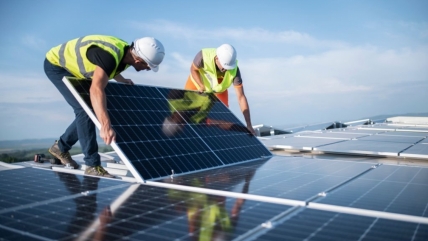New reliefs for the construction of photovoltaic systems

A new series of reliefs in the installation of small photovoltaics for roofs of houses are already a fact, after the end of last week MPs approved at second reading amendments to the Law on Spatial Planning. This is an important step for the new projects, because from 1 February households will be able to receive money for photovoltaic systems for heating water or building rooftop solar power plants to produce electricity, with the total budget of the grant funding being 59.8 million leva.
The changes to the Spatial Planning Act remove a number of requirements that have so far delayed projects, and this will allow significantly faster and more efficient movement of project documentation, which in some cases can take months.
One of the main changes is the removal of the requirement for a building permit for solar panels with a capacity of up to 20 kW for own use, as most rooftop installations are. The original version of the changes was that this would apply to up to 10.8 kW, but MPs subsequently changed the power requirement and so effectively extended the relief. Notification will be made in two places - to the chief architect of the municipality and to the relevant energy company.
1. Easy doesn't actually mean free
According to experts, switching to a notification regime, where energy is used only for own needs, without being resold, will unblock procedures, some of which are currently mired in red tape. The subtle point here is that although the procedure has been eased, it turns out that it is not free - for example, according to "Capital" magazine, the fee for submitting a notification for the construction of renewable energy for own consumption, collected by "ERP West", is 97 BGN.
With another amendment to the law, the construction of installations with a capacity of up to 1 MW outside the urban areas will also be subject to a simplified procedure. These projects will no longer require the preparation and approval of a detailed development plan.
2. Voluntarily... or not exactly
The changes largely correspond with the changes to the RES Act approved by the Council of Ministers at the end of 2022. In general terms, they provide for a significant easing of the connection procedures for new capacities up to 1 MW (roof and facade constructions), reducing the timeframes for the study and the issuance of the opinion on the conditions and method of connection (they will now be between 15 and 40 days). For installations up to and including 10.8 kW, an even lighter procedure for connection is foreseen, where the deadline is up to 30 days after the opinion is issued.
At first glance, the unblocking of the new projects speaks of resourceful thinking in view of the new realities - the separation from "Gazprom" amid the war in Ukraine, high electricity prices and the desire of businesses and households for energy independence. In fact, however, the reality is somewhat different, and they come because of the threat of sanctions.
By mid-2021, Bulgaria had to reflect the EU directive on the promotion of the use of energy from renewable sources (Directive (EU) 2018/2001) and since this did not happen, the European Commission has informed our country that it is starting an infringement procedure, which could end in court. A serious incentive was also the millions (for large plants and small PV for households) foreseen under the Recovery Plan, where quick and easy connection are part of the payment conditions.
3. Three months - 200 million leva
One of the most attractive measures under the Recovery Plan - the Renewable Energy and Battery Scheme with a total budget of BGN 200 million - will be open for applications for three months. Applications will open in February, said the Department for Innovation and Growth, which administers the measure. However, project proposals are likely to exceed its budget in the first month. The measure is aimed at the construction of solar panels on a company's roof, facade or the land on which it is located. The batteries will be capable of storing energy for up to several days, and the energy will be produced solely for their own use.







